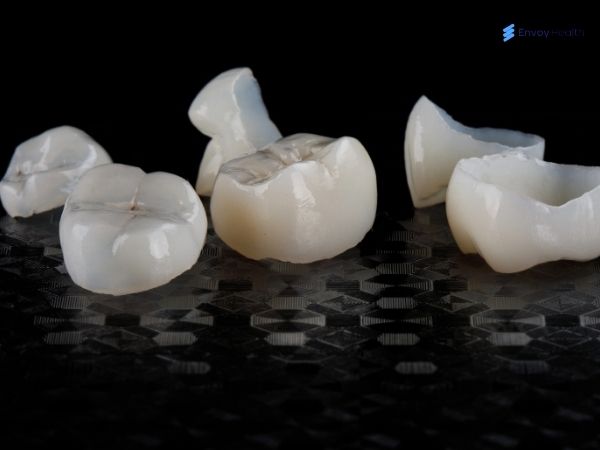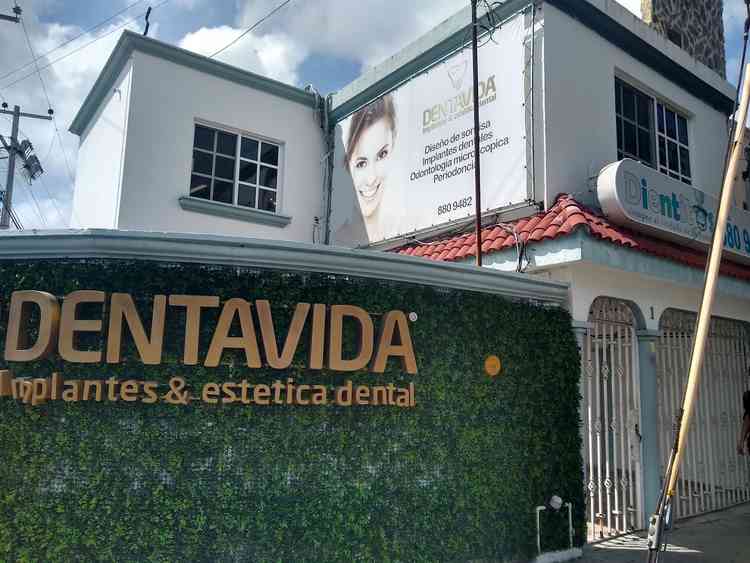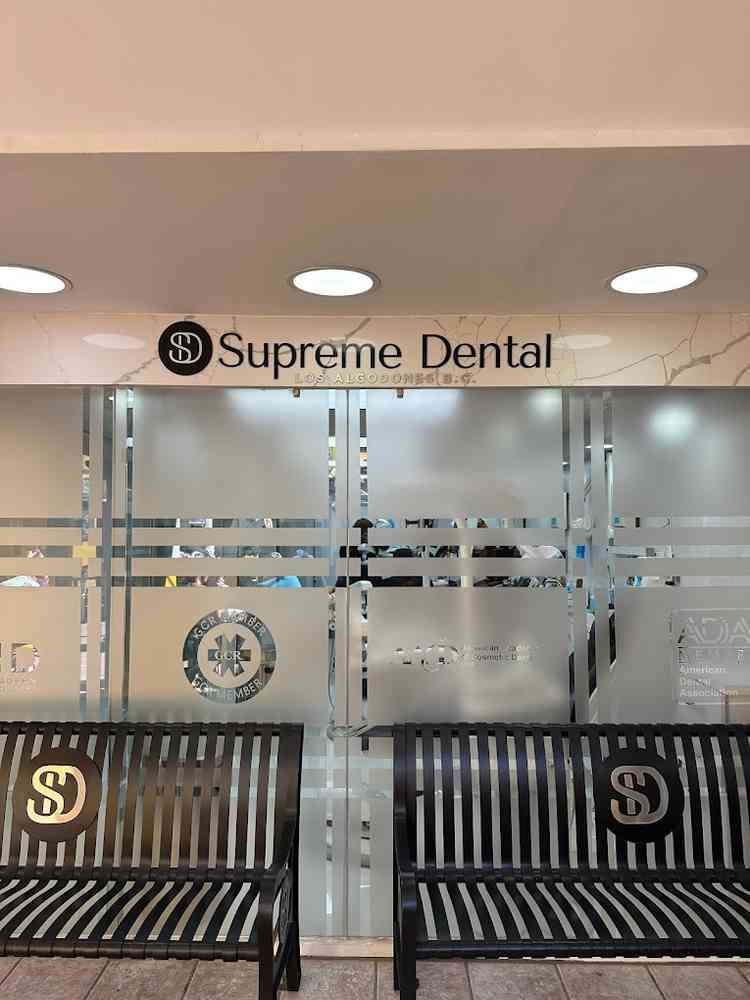How Long Does a Dental Crown Last? Average Lifespan and Warning Signs

Prathyusha Itikarlapalli
- Content Writer

Gustavo Moreno Vargas
- Reviewed by

Key Takeaways
- Dental crowns are the tooth caps that are used to cover the weakened (fractured) tooth structure, a dental implant post, or a root canal-treated tooth.
- The time that a dental crown lasts varies depending on the type, material chosen, the dentist's skill set, and the technology used. Most dental crowns last for 5-15 years, while a few have an exceptional longevity of 20 years.
- Chips, breaks, discoloration of the gumline along the crown, dislodging, or a sense of movement with pain and discomfort during biting are negative signs of a failing crown. See the dentist for immediate care as neglect can lead to bacterial accumulation, infection and abscess formation.
Why Do You Need a Dental Crown?
Dental crowns are tooth colored, protective caps. They are used to cover the weakened or cracked tooth. When placed over the damaged or decayed tooth, crowns restore its lost shape, size, and strength. In some cases, dental crowns are also placed over the dental implants. They cover the implant’s metal post, offering the complete functions of a natural tooth. While crowns are popular for their functional aspects, their aesthetic appeal is no less important. Dental crowns are customized dental prosthetics that precisely fit over the implant or tooth. They seamlessly blend with the remaining natural teeth.
Types of Dental Crowns
Dental crowns vary considerably based on the type of material they are made from. While the cost of tooth crowns varies with their chemical composition, so does their performance. Here, we briefly outlined the types of dental crowns.
- All-porcelain dental crowns are a metal-free option, made from dental ceramics such as porcelain. Being tooth-colored, they blend effectively with the natural smile and are ideal for use on front teeth. However, they lack strength and are prone to cracking when used for molar functions.
- The durable Porcelain-fused-to-metal crowns feature a layer of tooth-colored porcelain over the underlying metal substructure. The porcelain layer is intricately fused to the metal base, offering a blend of strength and a natural appearance. While these are sturdy, they may not be the right match for those who are allergic to metals.[1]
- The sturdy Zirconia dental crowns are made from the strong, durable zirconium dioxide. The material is renowned for its biocompatibility, durability, and aesthetic appeal. They are an ideal option for individuals with metal allergies and are best suited for use on back teeth.
- All-metal dental crowns vary in the material from which they are made. Typically, metal alloys such as gold, nickel-chromium, or cobalt-chromium are popularly used. They are not tooth-colored and are, of course, the cheapest dental crowns among others.

How Many Years Does a Dental Crown Last?
The lifespan of a dental crown usually ranges from 5 to 15 years. It is influenced by the type of material, your dental care routine, and everyday habits. Some varieties, such as all-metal crowns or those made from zirconia, can last for over 20 years when properly maintained and cared for. Note that this lifespan refers to the permanent crowns, which are custom-crafted using dental materials intended to last longer. Temporary crowns, on the other hand, are made from dental acrylic and are intended for short-term use. So if you ask us, “How long does a temporary dental crown last?”The answer is that these are designed to last only 2 to 3 weeks, just long enough to protect the tooth until your permanent crown is fabricated. In case you are wondering about the crown procedure, we also address a few commonly asked questions below:
How Long Does It Take To Get a Permanent Crown?
Getting a permanent crown follows a step-wise process and takes 2-3 weeks. The process begins with your dentist preparing the damaged tooth for crown placement and taking impressions of it to fabricate a permanent crown. The placement of a temporary crown will follow this. A temporary crown covers the treated tooth until your permanent crown is ready for installation. This will take around 2-3 weeks. Some modern dental labs rely on CAD/CAM technology, assuring precision and faster turnaround time. The dentist will remove the previously placed temporary crown and then secure the permanent one in place using dental cement.
Regardless of the permanence, ensuring good oral hygiene plays a key role in helping your dental crown last longer. Additionally, the expertise of your dentist significantly influences the longevity of your dental crown.[2] We elaborated on the factors affecting longevity in the upcoming section.
What Factors Affect How Much Time Does Dental Crown Last?
The following factors influence the life span of the dental crown.
Dentist Skill Set and Technology
Dentists use dental technology to collect tooth impressions and craft crowns. They either use conventional methods, such as putty, or a digital scanner for this purpose. Advanced dental technology, which utilizes digital scanners, provides accuracy and precision. Crowns meticulously crafted to fit snugly over the affected tooth leave the least chance for food and bacteria to get trapped beneath them. This will lengthen the lifespan of a crown.
Tooth Condition
A healthy tooth structure can provide a stronger foundation for the crown. It can anchor the dental crown with a stronger base. On the other hand, a weak or compromised tooth may cause the crown to loosen or fracture. Furthermore, decayed teeth that have undergone root canal treatment should be thoroughly cleared of bacteria. Otherwise, a crown after a root canal procedure for a severely decayed tooth, which harbors bacteria, is more likely to invite reinfection. This will lower the longevity of the dental crown.
Crown Type and Position
Crowns made from durable and sturdy materials, such as zirconia and metal alloys, typically last longer, often exceeding 20 years. Dentists typically recommend them for molars, where a strong chew force is required. Note that crown positioning also matters when considering their life span. So if you ask us, “How long do zirconia crowns last on front teeth?” These crowns exceptionally last longer, but do not blend well with the surrounding teeth. However, porcelain crowns are ideal for front teeth due to their natural hue. So if you ask us, “How long does a porcelain dental crown last?” The answer is that crowns made from materials like porcelain may chip or break due to normal wear and tear after approximately 15 years. However, these are an ideal choice for the front teeth because of their ability to blend seamlessly with the surrounding teeth. We addressed a few common questions that people ask us regarding crown longevity, specifically in relation to crown type and position.
- How long does a crown last on a molar?
A dental crown on a molar can last anywhere between 5 and 15 years, or even up to 20 years, depending on the level of oral hygiene and aftercare provided. Generally speaking, the molars, or back teeth, are prone to excessive pressure, making them vulnerable to breaking. Using materials like zirconia and gold can prolong the crown's lifespan.
- How long do crowns last on front teeth?
Dental crowns fixed on front teeth can last for 15-20 years, provided you are not prone to habits like bruxism. Front teeth are less prone to a stronger grinding force than back teeth, and do not wear and tear as easily. Dental materials, such as porcelain and porcelain-fused-to-metal, are chosen for their natural appearance and durability
- How long does a dental implant crown last?
A dental implant crown covers the metal implant post and is either screwed or cemented onto it. The implants last for a lifetime, and these crowns for implants are designed to last for 15-20 years. Note that the dental implant crowns are chosen only in cases where the natural tooth is missing.
- How long do crowns last after root canal?
Dental crowns following a root canal typically last 10-15 years, depending on the location of the tooth and the material chosen. Root canal-treated teeth are highly fragile and lack a blood supply. Dentists clean the root canals to remove the bacteria, debris, and seal them to prevent re-infection. Dental crowns made from zirconia, porcelain-fused-to-metal, and metal alloys are used to restore the tooth's function.
Teeth Clenching and Grinding
These habits can potentially harm the crown structure. Dental crowns are typically avoided for candidates who are prone to habits such as bruxism. Tightly pressing your teeth together and moving them front and back, while holding them tightly, may cause significant jaw discomfort. Furthermore, it also causes the crown surface to wear down, resulting in chips and cracks. Overall, it lowers the longevity of dental crowns. Besides, some candidates use their teeth to open bottle caps or tear open packets. These activities exert abnormal pressure, increasing the risk of damage.
Underlying Dental Health
Your dental and overall body health also determines the lifespan of dental crowns. Conditions such as chronic diabetes and autoimmune diseases compromise the candidate's ability to fight off minor infections. Furthermore, deteriorated oral health with receding gums exposes the crown margins, making the tooth vulnerable to decay. Both conditions can necessitate crown replacement. Sugar cereals, baked foods, and sticky candies can cling to teeth and become a continuous source of food for oral bacteria, causing tooth decay or chipping of the crown.
Furthermore, excessive reliance on acidic foods, beverages, and carbonated drinks erodes the enamel and dental cement. Over time, this can result in crown dislodgement. Routine dental check-ups and dental cleaning sessions help identify warning signs early on. Dentists can assess the crown's performance and look for symptoms of wear and tear. They can recommend the necessary preventive action to prevent the condition from worsening. This, in fact, prolongs the life of a dental crown.
While many understand the value of early detection, few are aware of the actual warning signs to look out for. The next section provides a detailed breakdown.
Watch for These Issues That Influence How Long Teeth Crown Last
Here are the signs of a worn dental crown that can quickly necessitate a replacement:
- Pain and discomfort occur while chewing or applying the slightest force. A worn-down crown either leaves rough edges or does not cover the underlying tooth completely, causing it to rub over the smooth surfaces of the gums and resulting in discomfort, tenderness, and swelling. Furthermore, worn crowns develop microcracks that are barely visible, but these invite bacterial accumulation, leading to decay and worsening the situation. Symptoms of sharp pain, discomfort, inflammation, and swelling on the crown-treated tooth should not be ignored.
- A loose-fitting crown that creates a sense of shifting while you bite or chew is a sign of dislodgement. While this is not sudden and may take months or years, the initial symptoms may often go unnoticed in many cases. Typically, crown dislodgement occurs due to excessive bite force, traumatic grinding that follows natural wear or erosion of the dental cement.
- A crown with noticeable chips or cracks requires immediate attention. A weakened crown after years of continued damage is likely to develop cracks. This can happen when you bite over hard nuts or ice. While a cracked crown can potentially harm the surrounding teeth, it may also cause sensitivity or lead to bacterial infection.
- A sense of bad taste or odor around your crown-fitted tooth indicates that food is trapped and bacterial action is active. When left unattended, it spreads aggressively, affecting the surrounding teeth. In some cases, an infected tooth can develop into a dental abscess, which can further exacerbate the situation.
- Discoloration or a dark line on the gumline around the crown is a sign of bacterial seepage. When left untreated, it can lead to a severe bacterial infection of the underlying tooth. Symptoms such as bad breath, a sour taste, and discomfort accompany this, indicating active decay and crown failure.
Risks of Damaged Dental Crowns
A damaged dental crown is more than just a cosmetic issue. It is more serious than it may seem, as it can complicate your oral health and the longevity of the crown. Ignoring the initial chips, cracks, and rough edges can lead to infection, tooth abscess, fracture, gum irritation, and crown failure. Besides, it also affects the functioning, compromising your ability to chew and grind food. You should see your dentist as soon as possible, before the symptoms worsen.
Final Word!
The lifespan of a tooth crown varies based on the material used, your oral habits, and how well you care for it. On average, dental crowns can last anywhere between 5 and 15 years; however, with proper maintenance and durable materials, they can last significantly longer. So, if you’ve been wondering how long does a dental crown last, the honest answer is: it depends. However, with good dental hygiene, regular check-ups, and avoidance of habits such as grinding or chewing hard objects, your crown can remain in place for decades.
Why leave your dental health to chance, or overpay for it? If you’re serious about getting a dental crown that lasts and fits your budget, Envoy Health is your trusted partner. We match you with pre-vetted clinics that use top-quality materials and expert care, at a fraction of the cost. Sign up now to get personalized options, exclusive perks, and real human support every step of the way. Your smile (and wallet) will thank you!
References
Disclaimer
The information in this article is for educational purposes only and does not replace medical advice. Always consult your doctor before starting any treatments.
Generally, porcelain crowns on front teeth last for 5-15 years or sometimes longer. The front teeth are not subjected to intense wear and tear or extensive grind forces. And hence they last longer, provided you maintain proper oral health.
Dental crowns are not designed to last for a lifetime. They function without compromising their effectiveness for at least 10 to 15 years. Depending on the ability to stick to strict oral hygiene, properly customized crowns can also last for two decades in some candidates. Attending regular dental check-ups can help detect crown failure early.
A properly fixed dental crown doesn’t need to be replaced for up to 15 years, provided you follow the right oral hygiene measures. While dental crowns are crafted to last for 5-15 years, it's no surprise that a few crowns also last for up to 20 years.
Dental crowns are placed on natural teeth, and the underlying tooth structure can last for a lifetime. All you need is a healthy tooth structure and a snugly fitting crown. A loose-fitting crown or one that leaves rough edges can trap food particles, leading to bacterial infection and cavities. Furthermore, a loose-fitting crown over the weakened tooth structure may develop cracks, allowing bacterial seepage and tooth damage.
Tooth decay under the crown occurs rarely when the procedure is performed correctly. However, it is likely to happen when the crown leaves rough edges or has developed minor cracks or chips. Food particles become trapped, leading to bacterial buildup, which in turn can cause tooth decay.
So, we partner with the premier healthcare facilities!
Send me the list





